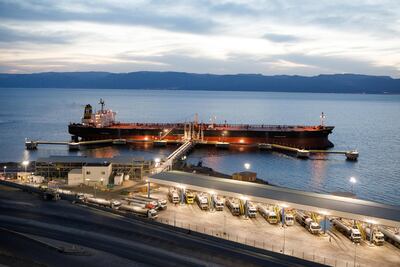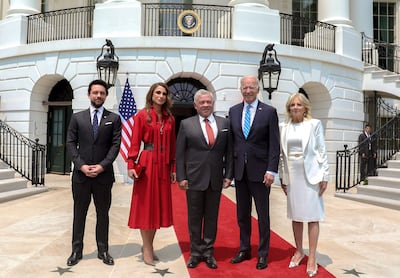Last week, Iran’s foreign minister, Hossein Amirabdollahian, visited Lebanon, on what many considered a visit to take advantage of the country’s economic crisis to tighten Tehran’s hold there. Mr Amirabdollahian said Iran was willing to help the Lebanese rebuild the Beirut port, large parts of which were destroyed in the explosion last year, as well as to construct two electrical power plants.
The Iranian pledges on economic assistance notwithstanding, the visit was eminently political. Iran and its Lebanese proxy Hezbollah can see that in the past year several regional and international actors have sought to play a role in Lebanese affairs – Arab states such as Egypt, Jordan, Qatar, and even Syria, as well as European countries such as France, not to mention the US. The Iranians want to contain such efforts to preserve Iran’s supremacy.
Yet what is revealing in the approach of certain Arab states, notably Egypt and Jordan, is that they seem to accept that Iran cannot be sidelined in the Levant. In their attitudes towards Lebanon and Syria, both countries have adopted a pragmatic attitude of increasing their stakes in countries dominated by Iran so as to build up influence and use this to bargain with the Iranians.
This reasoning appears to be behind the Egyptian and Jordanian decision to exploit the Arab natural gas pipeline that crosses Jordan, Syria and Lebanon to transport Egyptian gas to Lebanon for power generation. While Cairo and Amman have portrayed this as a means of helping a collapsing Lebanese power sector, the arrangement is more about geopolitics and regional calculations.

For the gas to arrive in Lebanon it would have to cross Syria, which is currently sanctioned under the Caesar Act – US legislation directed against the regime of Syrian President Bashar Al Assad for its wartime crimes. When King Abdullah of Jordan travelled to Washington in July, he appears to have persuaded the Biden administration to provide waivers to Jordan and Lebanon so the project could go forward and both countries would not be sanctioned under the act.
Indeed, it was the US ambassador in Beirut, Dorothy Shea, who announced the plan in August. The Americans, like an increasing number of Arab states, believe that if Lebanon were to disintegrate, Iran and Hezbollah alone would pick up the pieces and benefit. Preventing this is why they have altered their outlook.

Many Arab states are not yet ready to rehabilitate the Assad regime. However, they are willing to give it more leeway than before on the presumption that what Syria gains, particularly in Lebanon, will decrease the Iranians’ margin of manoeuvre and force Tehran to take broader Arab interests into consideration.
Such thinking has been behind Jordan’s rapid rapprochement with Syria in recent weeks. This culminated in a telephone conversation between King Abdullah and Mr Al Assad on October 3, following the re-opening of the Jaber crossing between the two countries on September 27. In an interview with CNN’s Fareed Zakaria in July, the king had already signalled that a change in policy was coming.
The policy of isolating those Arab countries in which Iran has pre-eminent power has brought limited returns. If anything, it has allowed Tehran to consolidate its power in those countries, when the reality on the ground allows for more imaginative Arab policies when it comes to political and communal affairs.
In Lebanon, for example, the Shiite community makes up only around 30 per cent of the population, while Sunnis are as numerous. Yet Hezbollah has dominated because Arab countries have quarantined Lebanon and its Sunnis, thinking the country is a lost cause. This represents an untenable political opportunity cost.
The Egyptians and Jordanians, as well as others, are reconsidering the benefits of outside pressure, understanding that it rarely brings about desired changes. At the same time, they are taking advantage of the fact that the US considers the Middle East less of a priority than before, so is more willing to allow regional actors to establish a balance of power among themselves, on their own terms.
Mr Amirabdollahian's visit is certainly tied to the Iranians’ understanding that regional ambitions will oblige them to defend their advantages throughout the Arab world – in Lebanon, Syria, but also Iraq, and perhaps even Yemen down the line. The Middle East is seeing a return to politics, where it has become an open field in which regional and international actors are competing.
This may appear to be something new in the past 30 years, since the end of the cold war and US hegemony, but it is also very much ingrained in the region’s history. This is especially true of the Levant, which has long been a battleground for the region’s empires or major powers. It is no surprise then that the dynamics today are filling the void left by an American empire in deliberate retreat.


